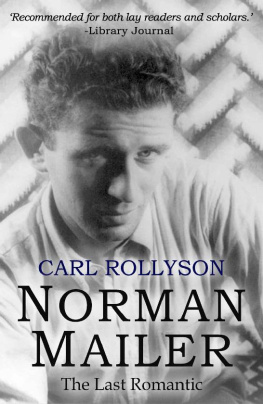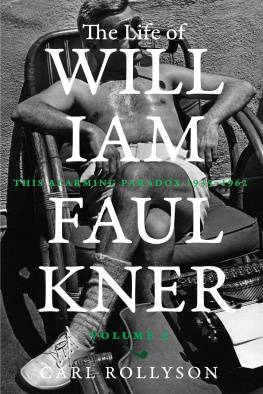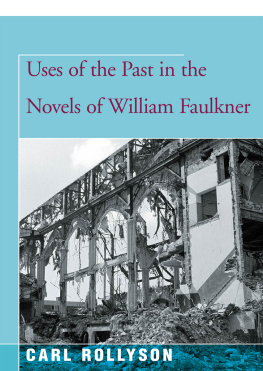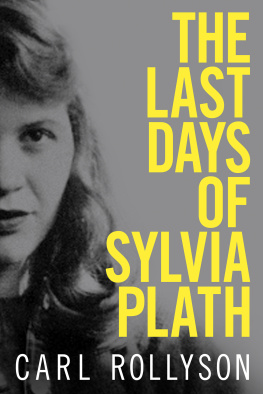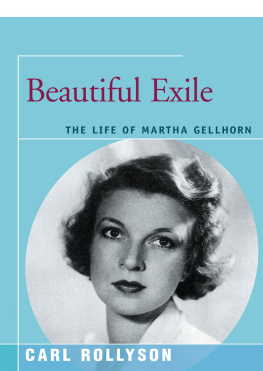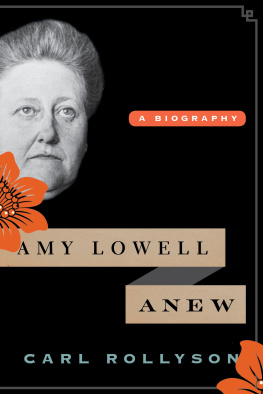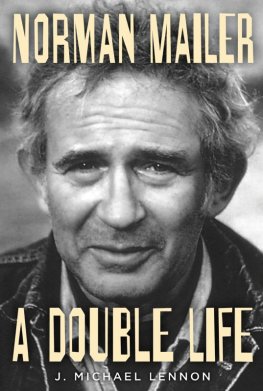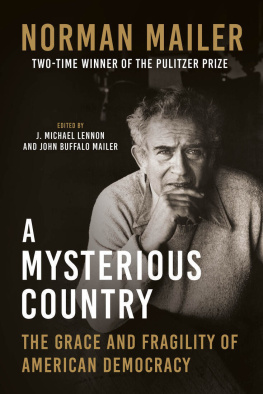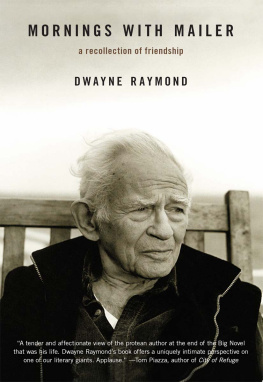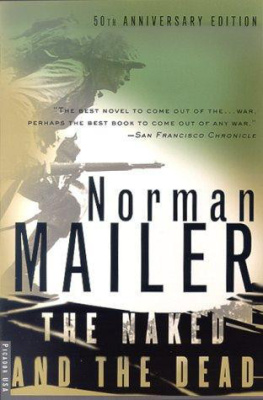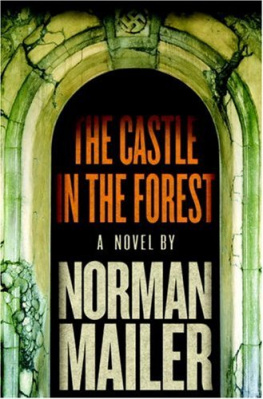Norman Mailer: The Last Romantic
Carl Rollyson
Carl Rollyson, 2008
Carl Rollyson has asserted his rights under the Copyright, Design and Patents Act, 1988, to be identified as the author of this work.
First published as The Lives of Norman Mailer: A Biography" by Paragon House in 1991.
This edition published in 2017 by The Odyssey Press, an imprint of Endeavour Press Ltd.
Table of Contents
Authors Note
What is new in this second edition of my Norman Mailer biography? Ive succinctly brought the reader up-to-date on Mailers post 1991 life and work. With the possible exception of Oswalds Tale no Mailer publication since 1991 has equaled, it seems to me, the best of his earlier books. Similarly, his public role as writer diminished after the early 1990s because he retreated from active engagement in the kinds of demonstrations that made him a cultural beacon. Or to put it another way, the culture shifted and Norman Mailer seemed less relevant to contemporary concerns. So I have not attempted to follow in detail a private or public life that seems to me to offer no new patterns or departures from what I described in my first edition.
*
A word about the title. I began reading Mailer as an undergraduate in the late 1960s. I was taking courses in history and historiography, and it struck me that his views were decidedly old fashioned or rather that he was attempting to bring back into fashion the sort of hero worship that governed the work of Thomas Carlyle. Whereas historians and sociologists downplayed the distinctive roles of individuals in the making of society, Mailer celebrated the solitary genius and the heroic man of action. Essays like The White Negro were an ingenious way of bootlegging the romantic idea into contemporary thought. And so I wrote about two pages of a paper I never completed. I called it The Last Romantic. It still seems to fit my subject better than any other I have considered.
*
In this new edition, I have also tried to read my own words anew, sharpening my sentences, omitting words and paragraphs sometimes entire sections that impeded the narrative, and in general providing, I believe, a refreshing, more engaging, and spirited account of one of Americas major writers.
The Shits are Killing Us
New York, 1954. John Maloney was an Irish drunk and a friend of Norman Mailer and William Styron. He was an enormously gifted man, a little older than these young writers and had been an editor in a publishing house. His main profession was drinking. He talked with a wonderful literary sense, he cared deeply for books and wrote well, reviewing for the New York Herald Tribune . He had a flaky mistress in the Village; it was a rocky relationship. One day he stabbed her and fled. At first, it all seemed very Dostoyevskyan and serious enough to be considered an assault. Finally, Maloney turned up on Styrons doorstep. Phone calls were made, the cops came, and Styron, Hiram Haydn (Styrons editor) and Mailer went down to jail to bail Maloney out. Eventually the charges were dropped, but at the time it seemed like a momentous event. After Maloneys release, they went to a bar. While Maloney and Haydn stepped out for a moment, Styron heard Mailer say, God, I wish I had the courage to stab a woman like that. That was a real gutsy act.
The incident stuck in Styrons mind. Years later he would repeat Mailers words in a whisper, as if to emphasize the confidence Mailer had blurted out to him. Mailer had spoken in envy of Maloney, in wonder and excitement over such an unbridled act. It was like a performance he admired, one that he wished he could rival. Mailer thought only of how good such an act would make him feel. He felt under considerable constraint if he thought it took courage to stab a woman. What kind of man would need a knife to let loose his emotions and to show his bravery? A man who was not himself, a man who saw society as conspiring to take away his true self. This is the thwarted man who could not let the Maloney incident alone, who would have to perform his own version of it more than five years later when he stabbed his wife Adele at the party that was supposed to herald his New York City mayoral campaign.
By the time Mailer took to the knife, he was approaching the end of the 1950s in an apocalyptic mood. This was the age of conformity, of mass man, the weakening of the ego, the extinction of individuality, the increase of psychopathy so wrote his friend, the psychoanalyst Robert Lindner, and so wrote Mailer in his controversial essay, The White Negro. This had been a dismal decade. After the great success of The Naked and The Dead in 1948, the critics had mauled his second novel, and his third had received no better than a tepid reception. And now five years without a novel, with only the promise of one eating away at him, he experimented with literary and political essays, some of which broke new ground as journalism but did nothing to appease his literary ambitions.
In desperation Mailer engaged in various blood rites fights and contests of strength with friends and strangers indulging the psychopath Robert Lindner said every man carried within himself. It would have been easy for Mailer to conform, given his middle class Jewish background and Harvard engineering degree; instead, he sought the instinct of rebellion, an instinct Lindner believed held the spark of originality:
since it reveals itself as a drive or urge toward mastery over every obstacle, natural or man-made, that stands as a barrier between man and his distant, perhaps never-to-be-achieved but always-striven-after goals. It is this instinct that underwrites his survival, this instinct from which he derives his nature: a great and powerful dynamic that makes him what he is restless, seeking, curious, forever unsatisfied, eternally struggling and eventually victorious Man is a rebel. He is committed by his biology not to conform, and herein lies the paramount reason for the awful tension he experiences today in relation to Society. Unlike other creatures of the earth, man cannot submit, cannot surrender his birthright of protest, for rebellion is one of his essential dimensions. He cannot deny it and remain man. In order to live he must rebel. Only total annihilation of humanity as a species can eliminate this in-built necessity.
Mailer felt he was fighting for his life, searching for his true identity. When he received an invitation to write a fifteenth anniversary report to his Harvard class of 1943, he replied with the desire to be destructive and therefore useful:
For the last few years I have continued to run in that overcrowded mob of unconscionable egotists who are all determined to become the next great American writer. But, given the brawl, the wasting of the will, and the sapping of ones creative rage by our most subtle and dear totalitarian time, politely called the time of conformity, I do not know that I would be so confident as to place the bet on myself any longer or indeed on any of my competitive peers.
Before composing this truculent prose, Mailer had considered writing the usual sedate account expected of alumni, but then he decided to fuck it, lets have something in this class report which is a little less predictable. For this age was all too predictable. Too many young men, in Mailers view, had failed to nourish the instinct of rebellion to say fuck it in their prose as well as in their lives; consequently, the America of the 1930s was a land of mediocrity and repression. People worried about whether their children would adjust; psychiatrists earned a good living helping everyone to regulate their behavior according to societal restraints. Lindner thought it was tragic that so much individuality should be destroyed, and he attacked his colleagues for advocating therapies that turned people into conformists. What Mailer had going for him, Lindner argued, was precisely his rebelliousness. Human progress was made only by rejecting the status quo, not going along with everyone else. A human being should be a catalyst for change.
Next page
